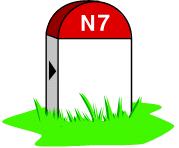| 英語喫茶〜英語・英文法・英会話〜 |
| <前の英会話ページへ> | <英会話インデックスへ> | <次の英会話ページへ> |
|
|
 |
 〜 彼女を紹介する 〜 〜 彼女を紹介する 〜  ―Two cats were sitting side by side at the pond in the campus. Sherry and Pina were still talking with each other.― “Okay, let's go to the sports stadium,” I said to Pina. “The sports stadium? I don't follow you.” “Bronx will be there. I've talked about him before, haven't I? I want to introduce you to Bronx.” “Bronx … I want to meet him. How far will we have to walk?” “It's not far. From here, we can see it four or five blocks away.” ―Two cats entered the sports stadium. And then they looked at the stands. But they weren't able to find Bronx.― “… Bronx is not here?” “Not here?” “He usually stands around here, especially during the morning.” “What happened to him?” “It's unusual.” “Does everyone like him?” “Yes. Almost all of the cats who live around here know him. And the cats who know him all like him.” “Oh, really? He is very famous.” “Anyway, he is reliable. But what happened?” |

|
<今日の単語> especially とくに、とりわけ unusual 普通でない、いつもと違った |

|
<今日の日本語訳> ―大学の池の側に2匹の猫が並んで座っていた。シェリーとピーナはまだ話をしていた。― 「そうだ、運動競技場に行ってみようよ。」と僕はピーナに言ってみた。 「運動競技場? 何を言っているの?」 「運動競技場にはブロンクスがいるんだ。ほら、前に少し話したことがあったろう? ピーナをブロンクスに紹介したいんだよ。」 「ブロンクスか。ちょっと会ってみたいな。運動競技場は遠いの?」 「そうでもないよ。ここからだと、4か5ブロック先に見えてくるよ。」 ―2匹は運動競技場の中に入ってきた。そしてスタンドのほうに来てみた。けれどブロンクスの姿はなかった。― 「...。ブロンクスは来ていないのか?」 「いないの?」 「いつもならいるんだけどね。この時間は特に。」 「どうしたんだろうね。」 「こういうことはめったにないんだよ。」 「ブロンクスは皆に好かれているの?」 「そうさ。この辺の猫はほとんどがブロンクスのことを知っているよ。そしてブロンクスを知る猫はみんなブロンクスが好きなのさ。」 「へぇ、そうなの。有名なんだ。」 「とにかく信頼のある猫だからね。でも今日はどうしたんだろう?」 |

|
<今日の日本語訳&英語訳> ―大学の池の側に2匹の猫が並んで座っていた。シェリーとピーナはまだ話をしていた。― ―Two cats were sitting side by side at the pond in the campus. Sherry and Pina were still talking with each other.― 「そうだ、運動競技場に行ってみようよ。」と僕はピーナに言ってみた。 “Okay, let's go to the sports stadium,” I said to Pina. 「運動競技場? 何を言っているの?」 “The sports stadium? I don't follow you.” 「運動競技場にはブロンクスがいるんだ。ほら、前に少し話したことがあったろう? ピーナをブロンクスに紹介したいんだよ。」 “Bronx will be there. I've talked about him before, haven't I? I want to introduce you to Bronx.” 「ブロンクスか。ちょっと会ってみたいな。運動競技場は遠いの?」 “Bronx … I want to meet him. How far will we have to walk?” 「そうでもないよ。ここからだと、4か5ブロック先に見えてくるよ。」 “It's not far. From here, we can see it four or five blocks away.” ―2匹は運動競技場の中に入ってきた。そしてスタンドのほうに来てみた。けれどブロンクスの姿はなかった。― ―Two cats entered the sports stadium. And then they looked at the stands. But they weren't able to find Bronx.― 「...。ブロンクスは来ていないのか?」 “… Bronx is not here?” 「いないの?」 “Not here?” 「いつもならいるんだけどね。この時間は特に。」 “He usually stands around here, especially during the morning.” 「どうしたんだろうね。」 “What happened to him?” 「こういうことはめったにないんだよ。」 “It's unusual.” 「ブロンクスは皆に好かれているの?」 “Does everyone like him?” 「そうさ。この辺の猫はほとんどがブロンクスのことを知っているよ。そしてブロンクスを知る猫はみんなブロンクスが好きなのさ。」 “Yes. Almost all of the cats who live around here know him. And the cats who know him all like him.” 「へぇ、そうなの。有名なんだ。」 “Oh, really? He is very famous.” 「とにかく信頼のある猫だからね。でも今日はどうしたんだろう?」 “Anyway, he is reliable. But what happened?” |
|
|
ここからは今日のポイントになります。 |
 |
  ★ポイント1 “The sports stadium? I don't follow you.” 「運動競技場? 何を言っているの?」 I don't follow you. は「あなたについていっていません。」という意味です。 相手の言葉や話の内容などが理解できないときに使うことができます。 Can you follow the teacher? (その先生の話していることがわかりますか?) No, I can't. (いいえ。)  ★ポイント2 I've talked about him before, haven't I? ほら、前に少し話したことがあったろう? これは付加疑問文といわれているものです。 文の後ろに疑問文をつけたすことで、「〜ですよね?」のように相手に同意や確認を求める表現として使うことができます。 前の文の場合、現在完了形の文ですので、後ろの疑問文は「haven't I?」となっています。これがたとえば、 I talked about him before. となっていれば、付加疑問文は、 I talked about him before, didn't I? になります。 また She talks about him. となっていれば、付加疑問文は、 She talks about him, doesn't she? になります。 上のように、肯定の後は否定の疑問文を置きます。 しかし否定の後は、肯定の疑問文を置きます。 この他、付加疑問文については英文法コンテンツ「基礎から英語学習(The Second Study Of English In Life)」でもふれています。「Day60」で説明しています。  ★ポイント3 “Bronx … I want to meet him. How far will we have to walk?” 「ブロンクスか。ちょっと会ってみたいな。運動競技場は遠いの?」 How far will we have to walk? は「私達はどのくらい歩かなければなりませんか?」という意味です。 このように How far 〜? は、「どのくらい?」というように「距離」や「程度」をたずねることができます。 Haven't they arrived yet? (彼らはまだ到着していないのですか?) No, they haven't. They are coming here by car. (はい、まだ到着していません。彼らは車で向かってきていますよ。) How far are they driving? (どのくらい彼らは向かってきていますか?) Maybe … they are driving about half of the way. (たぶん、彼らは道の半分ほどを来ていますね。)  ★ポイント4 Almost all of the cats who live around here know him. この辺の猫はほとんどがブロンクスのことを知っているよ。 Almost all of 〜 で、「ほとんどの〜」という意味で使うことができます。 Almost all of the students in our class like English. (私達のクラスのほとんどの学生は英語が好きです。) 逆に「ほとんどない」という意味では、「hardly any」を使うことができます。 Hardly any students attended the lecture. (ほとんどの学生はその講義に出席しなかった。)  |
| Sherry's Diary の練習問題 |
|
半角英数字で解答してください。 ついていけません、ほとんどの 問題数:4問 そうですよね 問題数:4問 どのくらいありますか 問題数:4問 ストーリーの確認問題です 問題数:3問 |
|
|
 |
| <前の英会話ページへ> | <英会話インデックスへ> | <次の英会話ページへ> |
| Copyright(c) 2004- 英語喫茶〜英語・英文法・英会話〜 : サイト内の文章・図の無断掲載を禁じます |